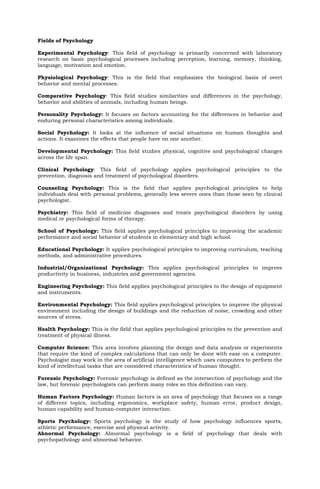
Fields of psychology
- 1. Fields of Psychology Experimental Psychology: This field of psychology is primarily concerned with laboratory research on basic psychological processes including perception, learning, memory, thinking, language, motivation and emotion. Physiological Psychology: This is the field that emphasizes the biological basis of overt behavior and mental processes. Comparative Psychology: This field studies similarities and differences in the psychology, behavior and abilities of animals, including human beings. Personality Psychology: It focuses on factors accounting for the differences in behavior and enduring personal characteristics among individuals. Social Psychology: It looks at the influence of social situations on human thoughts and actions. It examines the effects that people have on one another. Developmental Psychology: This field studies physical, cognitive and psychological changes across the life span. Clinical Psychology: This field of psychology applies psychological principles to the prevention, diagnosis and treatment of psychological disorders. Counseling Psychology: This is the field that applies psychological principles to help individuals deal with personal problems, generally less severe ones than those seen by clinical psychologist. Psychiatry: This field of medicine diagnoses and treats psychological disorders by using medical or psychological forms of therapy. School of Psychology: This field applies psychological principles to improving the academic performance and social behavior of students in elementary and high school. Educational Psychology: It applies psychological principles to improving curriculum, teaching methods, and administrative procedures. Industrial/Organizational Psychology: This applies psychological principles to improve productivity in business, industries and government agencies. Engineering Psychology: This field applies psychological principles to the design of equipment and instruments. Environmental Psychology: This field applies psychological principles to improve the physical environment including the design of buildings and the reduction of noise, crowding and other sources of stress. Health Psychology: This is the field that applies psychological principles to the prevention and treatment of physical illness. Computer Science: This area involves planning the design and data analysis or experiments that require the kind of complex calculations that can only be done with ease on a computer. Psychologist may work in the area of artificial intelligence which uses computers to perform the kind of intellectual tasks that are considered characteristics of human thought. Forensic Psychology: Forensic psychology is defined as the intersection of psychology and the law, but forensic psychologists can perform many roles so this definition can vary. Human Factors Psychology: Human factors is an area of psychology that focuses on a range of different topics, including ergonomics, workplace safety, human error, product design, human capability and human-computer interaction. Sports Psychology: Sports psychology is the study of how psychology influences sports, athletic performance, exercise and physical activity. Abnormal Psychology: Abnormal psychology is a field of psychology that deals with psychopathology and abnormal behavior.
- 2. Cross-Cultural Psychology: Cross-cultural psychology is a branch of psychology that looks at how cultural factors influence human behavior.